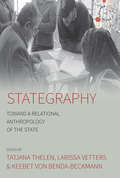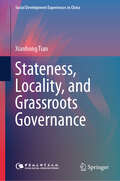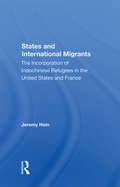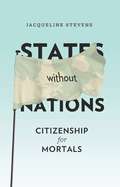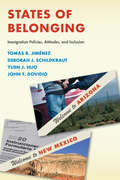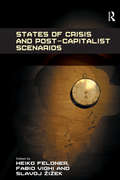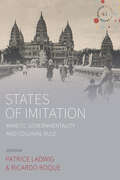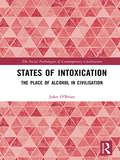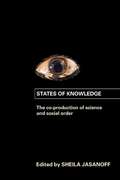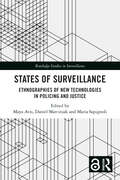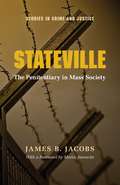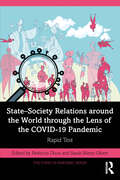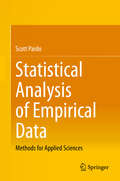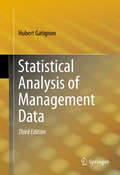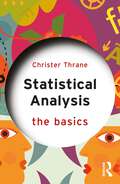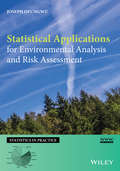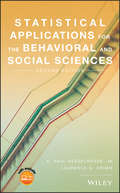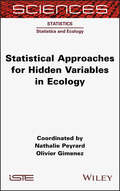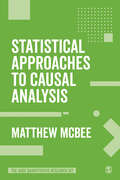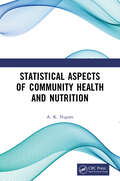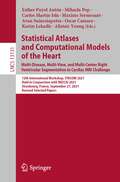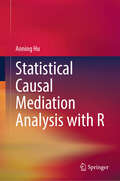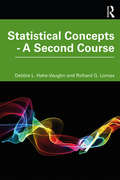- Table View
- List View
Stategraphy: Toward a Relational Anthropology of the State (Studies in Social Analysis #4)
by Keebet von Benda-Beckmann Tatjana Thelen Larissa VettersStategraphy—the ethnographic exploration of relational modes, boundary work, and forms of embeddedness of actors—offers crucial analytical avenues for researching the state. By exploring interactions and negotiations of local actors in different institutional settings, the contributors explore state transformations in relation to social security in a variety of locations spanning from Russia, Eastern Europe, and the Balkans to the United Kingdom and France. Fusing grounded empirical studies with rigorous theorizing, the volume provides new perspectives to broader related debates in social research and political analysis.
Stateness, Locality, and Grassroots Governance (Social Development Experiences in China)
by Xianhong TianBased on fieldwork in rural areas of Hubei, Zhejiang, Guangdong, Sichuan, Henan and other provinces, this book adopts a stateness and locality analytical framework to systematically study the process and mechanism of shaping peasant petitions by the state, revealing the relationship between the state and farmers in contemporary China. It tries to explore the deep code of state governance, describe the characteristics of China's state, and summarize the micro-experience and mechanism of state construction. This book tries to put forward the path of state building with "compound country" and holds that contemporary China is a compound country with both tradition and modernity. On the one hand, the state is increasingly focusing on the introduction and creation of modern governance rules; on the other hand, traditional rules still play an important role in national governance. More importantly, traditional rules and modern rules are often intertwined to jointly influence the shape of national governance, which not only shapes the "Chinese road" of state building but also adds many uncertain factors to China's path toward a modern state. The most important features and benefits of the book are: 1. The field investigation of this book is in-depth, and the data is relatively solid and systematic. The author explains the interactive relationship between the government (state) and farmers through rich and readable stories of farmers' petitions. 2.This book deeply analyzes the function mechanism of village social structure factors such as clan, faction, and stratum differentiation in farmers’ petitions. While paying attention to the interaction process between the state and society, it also pays attention to the function of structural variables, so as to unify the structure and process. 3.From the perspective of the relationship between state power and rural society, this book divides China's rural areas into four types: developed eastern areas, clan areas, family fragmentation areas, and atomized areas. On this basis, it analyzes the regional differences of farmers' petitioning behavior
States And International Migrants: The Incorporation Of Indochinese Refugees In The United States And France
by Jeremy HeinThis book focuses on the relationship between international migrants and host societies and discusses the historical uniqueness of the Indochinese refugee migration for the U.S. and France. It is more than the study of one refugee population and examines the relative importance of history.
States Without Nations: Citizenship for Mortals (New Directions in Critical Theory #34)
by Jacqueline StevensAs citizens, we hold certain truths to be self-evident: that the rights to own land, marry, inherit property, and especially to assume birthright citizenship should be guaranteed by the state. The laws promoting these rights appear not only to preserve our liberty but to guarantee society remains just. Yet considering how much violence and inequality results from these legal mandates, Jacqueline Stevens asks whether we might be making the wrong assumptions. Would a world without such laws be more just?Arguing that the core laws of the nation-state are more about a fear of death than a desire for freedom, Jacqueline Stevens imagines a world in which birthright citizenship, family inheritance, state-sanctioned marriage, and private land ownership are eliminated. Would chaos be the result? Drawing on political theory and history and incorporating contemporary social and economic data, she brilliantly critiques our sentimental attachments to birthright citizenship, inheritance, and marriage and highlights their harmful outcomes, including war, global apartheid, destitution, family misery, and environmental damage. It might be hard to imagine countries without the rules of membership and ownership that have come to define them, but as Stevens shows, conjuring new ways of reconciling our laws with the condition of mortality reveals the flaws of our present institutions and inspires hope for moving beyond them.
States of Belonging: Immigration Policies, Attitudes, and Inclusion
by Deborah J. Schildkraut John F. Dovidio Yuen J. Huo Tomas R. JimenezPolitical turmoil surrounding immigration at the federal level and the inability of Congress to pass comprehensive immigration reform have provided an opening for state and local governments to become more active in setting their own immigration-related policies. States largely dictate the resources, institutions, and opportunities immigrants can access: who can get a driver’s license or attend a state university, what languages are spoken in schools and public offices, how law enforcement interacts with the public, and even what schools teach students about history. In States of Belonging, an interdisciplinary team of immigration experts – Tomás R. Jiménez, Deborah J. Schildkraut, Yuen J. Huo, and John F. Dovidio – explore the interconnections among immigration policies, attitudes about immigrants and immigration, and sense of belonging in two neighboring states – Arizona and New Mexico – with divergent approaches to welcoming newcomers. Arizona and New Mexico are historically and demographically similar, but they differ in their immigration policies. Arizona has enacted unwelcoming policies towards immigrants, restricting the access of immigrants to state resources, social services, and public institutions. New Mexico is more welcoming, actively seeking to protect the rights of immigrants and extending access to state resources and institutions. The authors draw on an original survey and in-depth interviews of a cross-section of each state’s population to illustrate how these differing approaches affect the sense of belonging not only among immigrants, but among the U.S.-born as well. Respondents in Arizona, regardless of whether they were foreign- or native-born or their ethno-racial background, agreed that the state is unwelcoming to immigrants, and they pointed to Arizona’s restrictive policies as the primary factor. The sense of rejection perceived by Latinos in Arizona, including the foreign-born and the U.S.-born, was profound. They felt the effects of administrative and symbolic exclusions of the state’s unwelcoming policies as they went about their daily lives. New Mexico’s more welcoming approach had positive effects on the Latino immigrant population, and these policies contributed to an increased sense of belonging among U.S.-born Latinos and U.S.-born whites as well. The authors show that exposure to information about welcoming policies is associated with an improved sense of belonging across most population groups. They also find that the primary dividing line when it came to reactions to welcoming policies was political, not ethno-racial. Only self-identified Republicans, Latino as well as white, showed reduced feelings of belonging. States of Belonging demonstrates that welcoming policies cultivate a greater sense of belonging for immigrants and other state citizens, suggesting that policies aimed at helping immigrants gain a social, economic, and political foothold in this country can pay a broad societal dividend.
States of Crisis and Post-Capitalist Scenarios
by Heiko Feldner Fabio VighiStates of Crisis and Post-Capitalist Scenarios engages with the crisis of our capitalist world, with a view to explaining its origins, unravelling its symptoms, and demystifying the anodyne corrective solutions so far proposed. At the same time, it endorses the necessity for utopian interventions aimed at drastically rethinking our social order. Organised around the themes of economy and politics, critical theory, and culture in order to offer an impressive range of thematic perspectives and critical angles, the book delves into the most pressing of today’s quandaries by combining stringent critical analysis with creative foresight. A rigorous examination of the current crisis of late-capitalist society, States of Crisis and Post-Capitalist Scenarios develops paradigms that promise to rekindle the desire to move beyond capitalism towards a different social order. As such, it will appeal to scholars and students across the humanities and social sciences with particular interests in social and political theory, contemporary philosophy and the crises faced by the current capitalist order.
States of Imitation: Mimetic Governmentality and Colonial Rule (Studies in Social Analysis)
by Patrice Ladwig and Ricardo RoqueLate Western colonialism often relied on the practice of imitating indigenous forms of rule in order to maintain power; conversely, indigenous polities could imitate Western sociopolitical forms to their own benefit. Drawing on historical ethnographic studies of colonialism in Asia and Africa, States of Imitation examines how the colonial state attempted to administer, control, and integrate its indigenous subjects through mimetic governmentality, as well the ways indigenous states adopted these imitative practices to establish reciprocal ties with, or to resist the presence of, the colonial state.
States of Intoxication: The Place of Alcohol in Civilisation (The Social Pathologies of Contemporary Civilization)
by John O'BrienThis book provides an illuminating perspective on alcohol use, drawing on approaches from both anthropological research and historical sociology to examine our ambivalent attitudes to alcohol in the modern West. From anthropological research on non-Western, non-modern cultures, the author demonstrates that the use of alcohol or other psychoactive substances is a universal across human societies, and indeed, has tended to be seen as unproblematic, or even a sacred aspect of culture, often used in a highly ritualised context. From historical sociology, it is shown that alcohol has also been central to the process of state formation, not only as a crucial source of revenue, but also through having an important role in the formation of political communities, which frequently are a source of existential fear for ruling groups. Tracing this contradictory position occupied by alcohol over the course of history and civilisation, States of Intoxication sheds light on the manner in which it has produced the very peculiar modern perspective on alcohol.
States of Knowledge: The Co-Production of Science and the Social Order (International Library of Sociology)
by Sheila JasanoffNotes on contributors Acknowledgements 1. The Idiom of Co-production Sheila Jasanoff 2. Ordering Knowledge, Ordering Society Sheila Jasanoff 3. Climate Science and the Making of a Global Political Order Clark A. Miller 4. Co-producing CITES and the African Elephant Charis Thompson 5. Knowledge and Political Order in the European Environment Agency Claire Waterton and Brian Wynne 6. Plants, Power and Development: Founding the Imperial Department of Agriculture for the West Indies, 1880-1914 William K. Storey 7. Mapping Systems and Moral Order: Constituting property in genome laboratories Stephen Hilgartner 8. Patients and Scientists in French Muscular Dystrophy Research Vololona Rabeharisoa and Michel Callon 9. Circumscribing Expertise: Membership categories in courtroom testimony Michael Lynch 10. The Science of Merit and the Merit of Science: Mental order and social order in early twentieth-century France and America John Carson 11. Mysteries of State, Mysteries of Nature: Authority, knowledge and expertise in the seventeenth century Peter Dear 12. Reconstructing Sociotechnical Order: Vannevar Bush and US science policy Michael Aaron Dennis 13. Science and the Political Imagination in Contemporary Democracies Yaron Ezrah 14. Afterword Sheila Jasanoff References Index
States of Surveillance: Ethnographies of New Technologies in Policing and Justice (Routledge Studies in Surveillance)
by Maya Avis, Daniel Marciniak and Maria SapignoliRecent discussions on big data surveillance and artificial intelligence in governance have opened up an opportunity to think about the role of technology in the production of the knowledge states use to govern. The contributions in this volume examine the socio-technical assemblages that underpin the surveillance carried out by criminal justice institutions – particularly the digital tools that form the engine room of modern state bureaucracies.Drawing on ethnographic research in contexts from across the globe, the contributions to this volume engage with technology’s promises of transformation, scrutinise established ways of thinking that becomeembedded through technologies, critically consider the dynamics that shape the political economy driving the expansion of security technologies, and examine how those at the margins navigate experiences of surveillance.The book is intended for an interdisciplinary academic audience interested in ethnographic approaches to the study of surveillance technologies in policing and justice. Concrete case studies provide students, practitioners, and activists from a broad range of backgrounds with nuanced entry points to the debate.The Open Access version of this book, available at http://www.taylorfrancis.com, has been made available under a Creative Commons Attribution (CC-BY) 4.0 International license.
Stateville: The Penitentiary in Mass Society (Studies in Crime and Justice)
by James B. JacobsStateville penitentiary in Illinois has housed some of Chicago's most infamous criminals and was proclaimed to be "the world's toughest prison" by Joseph Ragen, Stateville's powerful warden from 1936 to 1961. It shares with Attica, San Quentin, and Jackson the notoriety of being one of the maximum security prisons that has shaped the public's conception of imprisonment. In Stateville James B. Jacobs, a sociologist and legal scholar, presents the first historical examination of a total prison organization—administrators, guards, prisoners, and special interest groups. Jacobs applies Edward Shils's interpretation of the dynamics of mass society in order to explain the dramatic events of the past quarter century that have permanently altered Stateville's structure. With the extension of civil rights to previously marginal groups such as racial minorities, the poor, and, ultimately, the incarcerated, prisons have moved from society's periphery toward its center. Accordingly Stateville's control mechanisms became less authoritarian and more legalistic and bureaucratic. As prisoners' rights increased, the preogatives of the staff were sharply curtailed. By the early 1970s the administration proved incapable of dealing with politicized gangs, proliferating interest groups, unionized guards, and interventionist courts. In addition to extensive archival research, Jacobs spent many months freely interacting with the prisoners, guards, and administrators at Stateville. His lucid presentation of Stateville's troubled history will provide fascinating reading for a wide audience of concerned readers. ". . . [an] impressive study of a complex social system."—Isidore Silver, Library Journal
State–Society Relations around the World through the Lens of the COVID-19 Pandemic: Rapid Test (The COVID-19 Pandemic Series)
by Federica Duca Sarah Meny-GibertThe collection examines state–society relations during the COVID-19 pandemic, from governance at the outset of the pandemic to vaccine rollouts, via a series of case studies from around the world. With a focus on the Global South, the book includes chapters on the experiences of – Angola, Zimbabwe, South Africa, Bolivia, Argentina, Brazil, Jamaica and Indonesia as well as contributions from the Global North – on Sweden, Canada, Czech Republic and New Zealand. The collection demonstrates that the effects of the pandemic can only be properly revealed by looking at the regional and local contexts in which states and societies experienced it. Contributors examine themes such as the nature of contemporary democracy, state capacity, the legitimacy of state institutions, and trust in government, questions of social solidarity, and forms and impacts of inequality. Focusing on national (or sub-national) cases, each chapter analyses the underlying forces and structures revealed when the authority of the state is brought to bear on the agency of citizens under emergency conditions. In doing so, contributors embed analysis of pandemic governance in the historical context of each country or region, highlighting how political choices, histories of the state’s treatment of citizens and the orientations of a region’s elites shaped the actions taken by the state. The book will be of interest to those looking to understand how the pandemic was interpreted, accepted, or contested at the local (national or sub-national) level and to those interested in state–society relations more generally. It will appeal to scholars and students interested in questions of pandemic government from a social scientific point of view and especially to those interested in perspectives from the Global South.
Statistical Modeling and Inference for Social Science
by Sean GailmardWritten specifically for graduate students and practitioners beginning social science research, Statistical Modeling and Inference for Social Science covers the essential statistical tools, models and theories that make up the social scientist's toolkit. Assuming no prior knowledge of statistics, this textbook introduces students to probability theory, statistical inference and statistical modeling, and emphasizes the connection between statistical procedures and social science theory. Sean Gailmard develops core statistical theory as a set of tools to model and assess relationships between variables - the primary aim of social scientists - and demonstrates the ways in which social scientists express and test substantive theoretical arguments in various models. Chapter exercises guide students in applying concepts to data, extending their grasp of core theoretical concepts. Students gain the ability to create, read and critique statistical applications in their fields of interest.
Statistical Analysis of Empirical Data: Methods for Applied Sciences
by Scott PardoResearchers and students who use empirical investigation in their work must go through the process of selecting statistical methods for analyses, and they are often challenged to justify these selections. This book is designed for readers with limited background in statistical methodology who seek guidance in defending their statistical decision-making in the worlds of research and practice. It is devoted to helping students and scholars find the information they need to select data analytic methods, and to speak knowledgeably about their statistical research processes. Each chapter opens with a conundrum relating to the selection of an analysis, or to explaining the nature of an analysis. Throughout the chapter, the analysis is described, along with some guidance in justifying the choices of that particular method.Designed to offer statistical knowledge to the non-specialist, this volume can be used in courses on research methods, or for courses on statistical applications to biological, medical, life, social, or physical sciences. It will also be useful to academic and industrial researchers in engineering and in the physical sciences who will benefit from a stronger understanding of how to analyze empirical data. The book is written for those with foundational education in calculus. However, a brief review of fundamental concepts of probability and statistics, together with a primer on some concepts in elementary calculus and matrix algebra, is included. R code and sample datasets are provided.
Statistical Analysis of Management Data
by Hubert GatignonStatistical Analysis of Management Data provides a comprehensive approach to multivariate statistical analyses that are important for researchers in all fields of management, including finance, production, accounting, marketing, strategy, technology, and human resources. This book is especially designed to provide doctoral students with a theoretical knowledge of the concepts underlying the most important multivariate techniques and an overview of actual applications. It offers a clear, succinct exposition of each technique with emphasis on when each technique is appropriate and how to use it. This second edition, fully revised, updated, and expanded, reflects the most current evolution in the methods for data analysis in management and the social sciences. In particular, it places a greater emphasis on measurement models, and includes new chapters and sections on: confirmatory factor analysis canonical correlation analysis cluster analysis analysis of covariance structure multi-group confirmatory factor analysis and analysis of covariance structures. Featuring numerous examples, the book may serve as an advanced text or as a resource for applied researchers in industry who want to understand the foundations of the methods and to learn how they can be applied using widely available statistical software.
Statistical Analysis: The Basics (The Basics)
by Christer ThraneStatistical Analysis: The Basics provides an engaging and easy‑to‑read primer on this sometimes daunting subject. Intended for those with little or no background in mathematics or statistics, this book explores the importance of statistical analysis in the modern world by asking statistical questions about data and explains how to conduct such analyses and correctly interpret the results.Packed with everyday examples from sport, health, education, and leisure, it reinforces the understanding of core topics while avoiding the heavy use of equations and formulae. Written in a highly accessible style and adopting a hands‑on approach, each chapter is accompanied by a summary of key points, illustrations and tables, and recommendations for further reading, with the final chapter delving into the practicalities of conducting a real‑life statistical research project.Statistical Analysis: The Basics is essential reading for anyone who wishes to master the fundamentals of modern‑day statistical analysis.
Statistical Applications for Environmental Analysis and Risk Assessment
by Joseph OfungwuStatistical Applications for Environmental Analysis and Risk Assessment guides readers through real-world situations and the best statistical methods used to determine the nature and extent of the problem, evaluate the potential human health and ecological risks, and design and implement remedial systems as necessary. Featuring numerous worked examples using actual data and "ready-made" software scripts, Statistical Applications for Environmental Analysis and Risk Assessment also includes:* Descriptions of basic statistical concepts and principles in an informal style that does not presume prior familiarity with the subject* Detailed illustrations of statistical applications in the environmental and related water resources fields using real-world data in the contexts that would typically be encountered by practitioners* Software scripts using the high-powered statistical software system, R, and supplemented by USEPA's ProUCL and USDOE's VSP software packages, which are all freely available* Coverage of frequent data sample issues such as non-detects, outliers, skewness, sustained and cyclical trend that habitually plague environmental data samples* Clear demonstrations of the crucial, but often overlooked, role of statistics in environmental sampling design and subsequent exposure risk assessment.
Statistical Applications for the Behavioral and Social Sciences
by Laurence G. Grimm K. Paul Nesselroade JrAn updated edition of a classic text on applying statistical analyses to the social sciences, with reviews, new chapters, an expanded set of post-hoc analyses, and information on computing in Excel and SPSS Now in its second edition,Statistical Applications for the Behavioral and Social Sciences has been revised and updated and continues to offer an essential guide to the conceptual foundations of statistical analyses (particularly inferential statistics), placing an emphasis on connecting statistical tools with appropriate research contexts. Designed to be accessible, the text contains an applications-oriented, step-by-step presentation of the statistical theories and formulas most often used by the social sciences. The revised text also includes an entire chapter on the basic concepts in research, presenting an overall context for all the book’s statistical theories and formulas. The authors cover descriptive statistics and z scores, the theoretical underpinnings of inferential statistics, z and t tests, power analysis, one/two-way and repeated-measures ANOVA, linear correlation and regression, as well as chi-square and other nonparametric tests. The second edition also includes a new chapter on basic probability theory. This important resource: • Contains information regarding the use of statistical software packages; both Excel and SPSS • Offers four strategically positioned and accumulating reviews, each containing a set of research-oriented diagnostic questions designed to help students determine which tests are applicable to which research scenarios • Incorporates additional statistical information on follow-up analyses such as post-hoc tests and effect sizes • Includes a series of sidebar discussions dispersed throughout the text that address, among other topics, the recent and growing controversy regarding the failed reproducibility of published findings in the social sciences • Puts renewed emphasis on presentation of data and findings using the APA format • Includes supplementary material consisting of a set of “kick-start” quizzes designed to get students quickly back up to speed at the start of an instructional period, and a complete set of ready-to-use PowerPoint slides for in-class use Written for students in areas such as psychology, sociology, criminology, political science, public health, and others, Statistical Applications for the Behavioral and Social Sciences, Second Edition continues to provide the information needed to understand the foundations of statistical analyses as relevant to the behavioral and social sciences.
Statistical Approaches for Hidden Variables in Ecology
by Olivier Gimenez Nathalie PeyrardThe study of ecological systems is often impeded by components that escape perfect observation, such as the trajectories of moving animals or the status of plant seed banks. These hidden components can be efficiently handled with statistical modeling by using hidden variables, which are often called latent variables. Notably, the hidden variables framework enables us to model an underlying interaction structure between variables (including random effects in regression models) and perform data clustering, which are useful tools in the analysis of ecological data.This book provides an introduction to hidden variables in ecology, through recent works on statistical modeling as well as on estimation in models with latent variables. All models are illustrated with ecological examples involving different types of latent variables at different scales of organization, from individuals to ecosystems. Readers have access to the data and R codes to facilitate understanding of the model and to adapt inference tools to their own data.
Statistical Approaches to Causal Analysis (The SAGE Quantitative Research Kit)
by Matthew McBeeThis book provides an up-to-date and accessible introduction to causal inference in quantitative research. Featuring worked example datasets throughout, it clearly outlines the steps involved in carrying out various types of statistical causal analysis. In turn, helping you apply these methods to your own research. It contains guidance on: Selecting the most appropriate conditioning method for your data. Applying the Rubin’s Causal Model to your analysis, a mathematical framework for understanding and ensuring accurate causation inferences. Utilising various techniques and designs, such as propensity scores, instrumental variables analysis, and regression discontinuity designs, to better synthesise and analyse different types of data. Part of The SAGE Quantitative Research Kit, this book will give you the know-how and confidence needed to succeed on your quantitative research journey.
Statistical Approaches to Causal Analysis (The SAGE Quantitative Research Kit)
by Matthew McBeeThis book provides an up-to-date and accessible introduction to causal inference in quantitative research. Featuring worked example datasets throughout, it clearly outlines the steps involved in carrying out various types of statistical causal analysis. In turn, helping you apply these methods to your own research. It contains guidance on: Selecting the most appropriate conditioning method for your data. Applying the Rubin’s Causal Model to your analysis, a mathematical framework for understanding and ensuring accurate causation inferences. Utilising various techniques and designs, such as propensity scores, instrumental variables analysis, and regression discontinuity designs, to better synthesise and analyse different types of data. Part of The SAGE Quantitative Research Kit, this book will give you the know-how and confidence needed to succeed on your quantitative research journey.
Statistical Aspects of Community Health and Nutrition
by A. K. NigamThis book provides a detailed view of public nutrition and health. It discusses the various statistical tools and their appropriate application in public health and nutrition research, surveys, evaluation and program designing. The subject matter of this book covers a range of topics including statistical issues pertaining to measurement of hunger and food security, hunger mapping, diseases in community clusters, randomized response technique for sensitive characteristics, small area estimation and gender disparity.Print edition not for sale in South Asia (India, Sri Lanka, Nepal, Bangladesh, Pakistan and Bhutan)
Statistical Atlases and Computational Models of the Heart. Multi-Disease, Multi-View, and Multi-Center Right Ventricular Segmentation in Cardiac MRI Challenge: 12th International Workshop, STACOM 2021, Held in Conjunction with MICCAI 2021, Strasbourg, France, September 27, 2021, Revised Selected Papers (Lecture Notes in Computer Science #13131)
by Oscar Camara Mihaela Pop Maxime Sermesant Alistair Young Avan Suinesiaputra Karim Lekadir Esther Puyol Antón Carlos Martín-IslaThis book constitutes the proceedings of the 12th International Workshop on Statistical Atlases and Computational Models of the Heart, STACOM 2021, as well as the M&Ms-2 Challenge: Multi-Disease, Multi-View and Multi-Center Right Ventricular Segmentation in Cardiac MRI Challenge.The 25 regular workshop papers included in this volume were carefully reviewed and selected after being revised. They deal with cardiac imaging and image processing, machine learning applied to cardiac imaging and image analysis, atlas construction, artificial intelligence, statistical modelling of cardiac function across different patient populations, cardiac computational physiology, model customization, atlas based functional analysis, ontological schemata for data and results, integrated functional and structural analyses, as well as the pre-clinical and clinical applicability of these methods. In addition, 15 papers from the M&MS-2 challenge are included in this volume. The Multi-Disease, Multi-View & Multi-Center Right Ventricular Segmentation in Cardiac MRI Challenge (M&Ms-2) is focusing on the development of generalizable deep learning models for the Right Ventricle that can maintain good segmentation accuracy on different centers, pathologies and cardiac MRI views. There was a total of 48 submissions to the workshop.
Statistical Causal Mediation Analysis with R
by Anning HuThis book comprehensively covers various causal mediation analysis (CMA) methods developed across multiple fields, organizing them into a reader-friendly progression of methodological advancements. Interest in the mechanisms that form causal relationships is widespread across various fields, including sociology, demography, economics, political science, psychology, epidemiology, public health, and educational studies, to name a few. Compared to the well-established research focusing on bivariate causality, CMA—the study of mediation mechanisms within the framework of causal inference—requires more complex identification assumptions, estimation methods, and nuanced interpretations of the results. Therefore, to conduct CMA with rigor, one must acquaint themselves with a distinct and systematic body of knowledge that is clearly separate from traditional linear regression modeling or structural equation modelling (SEM). Against this backdrop, the objectives of the proposed book are twofold. Firstly, it aims to offer readers an approachable and engaging explanation of the statistical theories underpinning the diverse methods of CMA. Specifically, we highlight the crucial mediation identification assumptions—a critical aspect frequently neglected by practitioners and educators. Secondly, the book intends to guide readers through detailed, step-by-step examples of applying CMA methods in practical research contexts. Through this approach, readers are anticipated to gain practical skills necessary for addressing their own research or teaching challenges. This book begins with traditional methods that rely on differences or products of coefficients in linear regression modeling, moves on to CMA involving a single mediator, and advances to more sophisticated approaches that manage parallel or sequentially ordered mediators. Additionally, sensitivity analysis is introduced as an important supplementary analytical step. Thus, the content spans from conventional CMA tools to the forefront methodologies that have emerged in recent decades. The book is designed to be self-sufficient, characterized by a balanced and well-integrated presentation of both theory and application.
Statistical Concepts - A Second Course
by Richard G. Lomax Debbie L. Hahs-VaughnStatistical Concepts—A Second Course presents the last 10 chapters from An Introduction to Statistical Concepts, Fourth Edition. Designed for second and upper-level statistics courses, this book highlights how statistics work and how best to utilize them to aid students in the analysis of their own data and the interpretation of research results. In this new edition, Hahs-Vaughn and Lomax discuss sensitivity, specificity, false positive and false negative errors. Coverage of effect sizes has been expanded upon and more organizational features (to summarize key concepts) have been included. A final chapter on mediation and moderation has been added for a more complete presentation of regression models. This book acts as a clear and accessible instructional tool to help readers fully understand statistical concepts and how to apply them to data. It is an invaluable resource for students undertaking a course in statistics in any number of social science and behavioral science disciplines.
